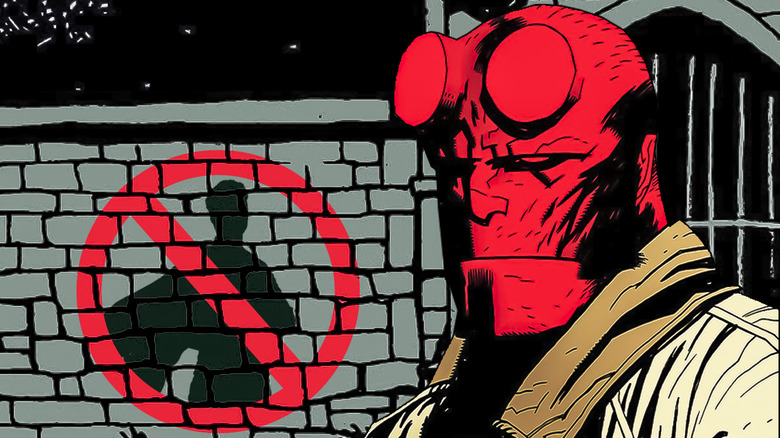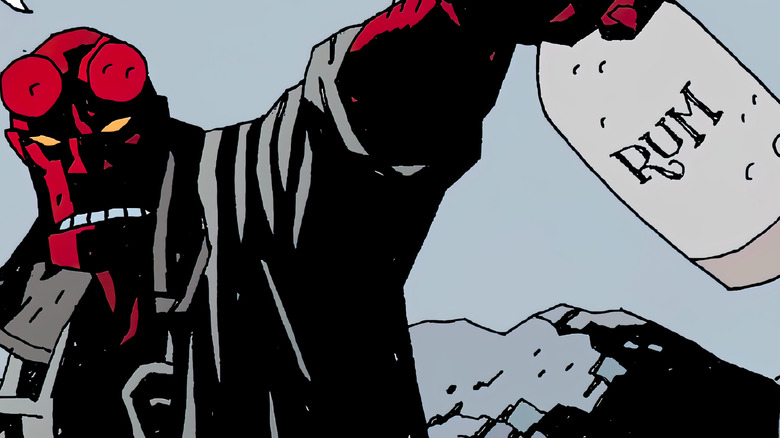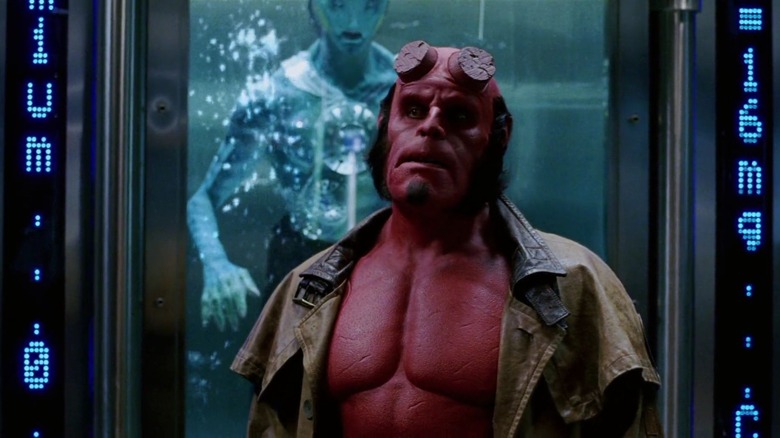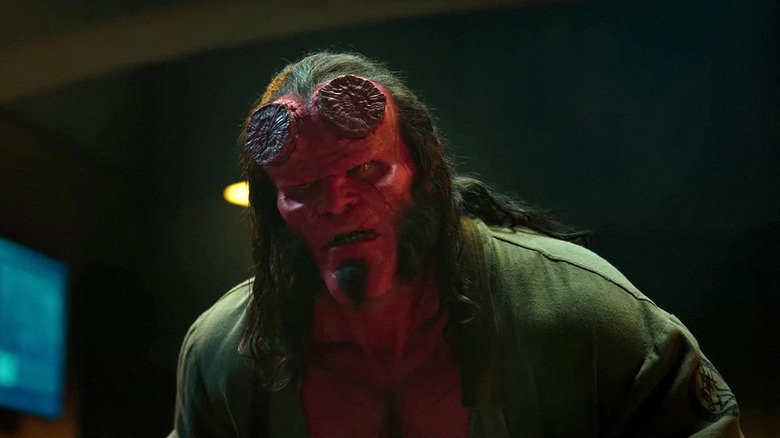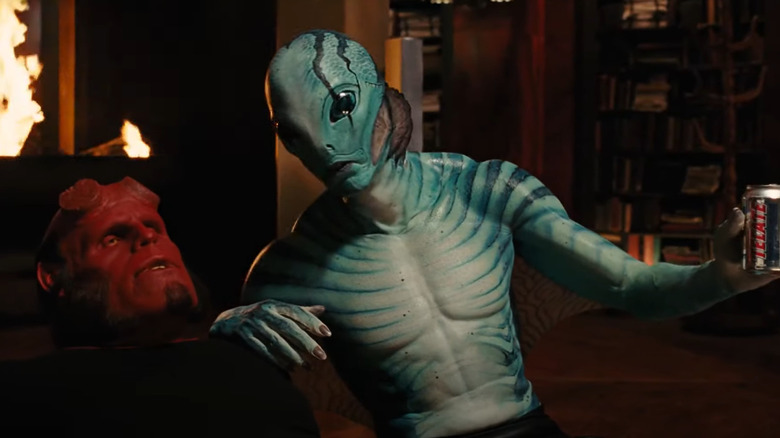Hellboy's Rebooting Again? Great - Let's Ditch The Superheroes And Embrace The Folk-Horror Detective Of The Comics
So, there's this achingly pretty short story called "The Troll-witch," written and illustrated by Hellboy creator Mike Mignola. In it, Hellboy is hired to hunt down some man-eating trolls in the countryside around a small Norwegian village. It has all the makings of a classic comic book dust-up: Hellboy versus giant monsters. Somebody's getting a beat down. His first stop is the home of a monstrous nearby troll-witch, no doubt involved in all this skullduggery, who asks if he's there to kill her. He doesn't rule it out.
The witch tells Hellboy a classic Mignola fable, something somewhere between a memoir and a parable. She brings up questions about why a hypothetical "monster," when shown love by normal people, would feel instinctively compelled to kill other monsters (all entirely rhetorical, obviously). Then, she explains to the half-demon how he can get rid of the village's troll problem conflict-free, saving the townspeople without throwing a punch — not the way he's expected to do things, but maybe the right way. "No blow struck, no drop of blood spilled." She closes out the conversation, asking, "And I wonder, how will you feel about that?"
The iconography of Hellboy is undeniable, and nobody knows that better than Hollywood producers. There, the character has seen two live-action iterations across three movies since 2004, which makes perfect sense. After all, think of the possibilities that come with the rights to the character — the stunning backlog of compelling stories, the colorful cast of visually distinctive characters, all branded nose to toes with the unimpeachably t-shirt-ready B.P.R.D. logo. The pieces almost beg to come together and spell a perfect — dare we say the phrase? — "cinematic universe."
We won't say it. Neither should studios. Because Hellboy was never supposed to be a superhero franchise, and it shouldn't be one.
Hellboy: Specifically un-super
In a pretty great interview from a few years back, a YouTuber named Amsterdam Comic Geek sat down with comic book legend Mike Mignola. Mignola explained that he invented Hellboy after a decade in the comic book industry specifically to get away from drawing superheroes. He wanted to make something else, and he knew that he'd have to create his own world in which to do it. He'd pull inspiration from his dad, a woodworker who "would always come home scraped up," the writer and artist recalled. "Dried blood on the side of his head [...] he'd say 'Oh yeah, I got stuck with a nail,' or 'my hand got caught in this machine,' but it was always so 'no-big-deal.'"
According to Mignola, that was what influenced the physicality and attitude of his best-known creation. In an industry where the safe bet seems to be imitation over innovation, Mignola gambled on foregoing another palette-swapped retread of an existing property. Instead of spraying Ghost Rider with a fire extinguisher and calling him Spawn (yes, comic nerds, we're oversimplifying) he built something new — a blue-collar, work-a-day hero who shrugged off gruesome injuries with a brew and a stack of pancakes. Also, he was a half-demon destined to end the world, but that part was secondary. The Hellboy of the comics slumps through his adventures, cigarette hanging from his lips, with the posture of a teenager who doesn't want to be there. His stories move slowly, quietly, intensely, more "The Batman" than "Batman," if that makes sense.
So why does this decidedly un-superheroic figure seem destined to keep getting pigeonholed into tropey, more-of-the-same comic book movies? Well ...
Del Toro's Hellboy movies were a product of their time, but they crystallized a certain take
To be fair, this whole thing is partially Guillermo del Toro's fault. It's true that the Spanish auteur's take on the character in "Hellboy" and "Hellboy II: The Golden Army" is still the most beloved interpretation that fans have seen on the big screen. That said, production was an understandably uphill battle, and changes had to be made to the source material to sell "literal demon protagonist fights big frogs" as a movie. Del Toro stood his ground on plenty of stuff — Hellboy (Ron Perlman) wouldn't transform into a demon when he got angry, or have an adorable pet hellhound, but Abe Sapien (Doug Jones) got psychic powers, Liz Sherman (Selma Blair) became a hesitantly powerful Jean Grey-type love interest for the main character, and the world took on a different feel from the comics — "X-Men" meets "Men In Black" but they're hunting demons, if you had to sum it up in an easily digestible elevator pitch.
That first movie is still a blast, but it's a product of the system and time period that it came from, where the studios wanted to sell Hellboy as a classic comic book superhero because superheroes were beginning to emerge as a marketable bet. And once you establish a character as belonging in a certain genre, it can be hard to convince studios that they belong in another — and being a "superhero" going into the 2010s could only mean one thing.
The 2019 Hellboy reboot made it all worse
Back in the 2010s, every studio was swinging wildly to get their own MCU. So, it was pretty clear what Summit Entertainment had in mind in the days leading up to 2019's "Hellboy." The reboot, which saw David Harbour perfectly cast but criminally misused as the titular half-demon investigator, was sloppy with Feige envy. Like lots of would-be franchises trying to catch up with Disney's Unlimited Cinematic ATM, the film went hard and fast with its multimedia ambitions, not so much hiding Easter eggs as chucking them at the audience and shouting "wouldn't more of this be fun?"
"Abe Sapien!" the film cried out, in its final moments. "That'll get you to come back!"
Not really. At the box office, the movie ate fistfuls of dirt. Critics and audiences were not amused. Now, after a healthy four-year breathing period, Hellboy is headed back to theaters, this time with "Deadpool 2" performer Jack Kesy filling the polyurethane rock fist with pints of his SAG-eligible sweat. The new flick is based on the three-part series "The Crooked Man," a story that culminates in a graveyard monster shootout. It will take, if not a miracle, some sort of bleakly high-contrast eldritch ritual to ensure that it isn't another eminently forgettable CGI explosion factory.
Bring us the working class, folk-horror detective Hellboy we want
Maybe it's appropriate that Hollywood keeps trying to turn Hellboy into a cookie cutter superhero. Maybe it's even more appropriate that it keeps not working.
The character's stories have always been about the way that we're changed by the expectations of the people around us. Hellboy's adoptive father and government handlers want him to be a hero, so he grinds down his facial features to try to fit in with them. His biological father wanted him to herald the apocalypse, physically removing his baby's hand and replacing it with a stone artifact to ensure it would happen. Ultimately, inspirationally, the character is who he is: Not a superhero, not a monster, but the world's greatest paranormal investigator. The caricatured memory of the Greatest Generation, blue collar machismo, and Catholic guilt. A working-class guy with cloven hooves who's just here to help.
There's a movie worth seeing there, and it's not about making the biggest CGI punch-up bloodbath, or desperately winking at moviegoers while you drop breadcrumbs on the way to a seven-sequel release schedule. It's about a smart, working class guy — who, yes, has a hand made out of rocks, and is sometimes surrounded by leprechauns — doing his best, trying to keep people safe. Brains, grit, atmosphere, and determination should come first, while his penchant for hitting things with a rock fist (that audiences can buy as a keychain) should be a distant second.
And hey, maybe that's not the movie studios think audiences want. Maybe it's not the movie anybody expects. But it is the Hellboy of the comics, and he deserves a chance on the big screen.
"And I wonder," the witch says, "how will you feel about that?"
